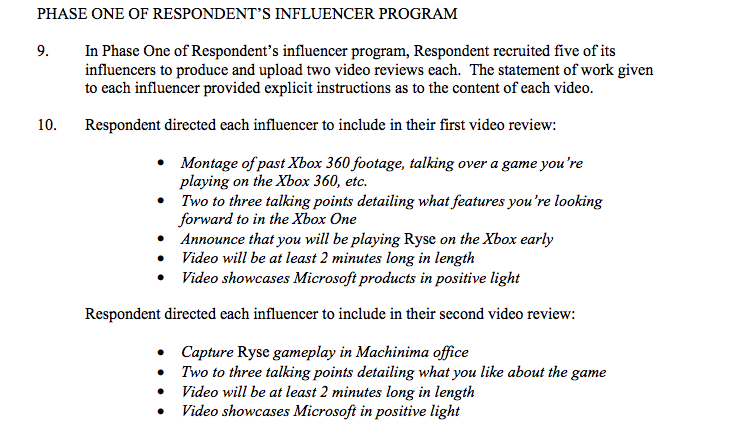Around the launch of the Xbox One, the YouTube network Machinima held a special campaign for its clients: Make a positive video about Microsoft’s newest console, and you’ll get paid extra. Also, you’re not allowed to talk about any of this.
Seems sketchy, right? The US Federal Trade Commission certainly thought so, and after an investigation into Machinima’s Xbox One campaign, they charged that the popular YouTube company had been involved in “deceptive advertising” by paying video-makers to advertise for Microsoft without proper disclosure.
In a press release today, the FTC announced that the two parties have come to a settlement that will prevent Machinima from pulling this sort of shadiness again. Writes the FTC: “Under the proposed settlement, Machinima is prohibited from similar deceptive conduct in the future, and the company is required to ensure its influencers clearly disclose when they have been compensated in exchange for their endorsements.”
Machinima, which was founded in 2000, hosts a number of popular YouTube personalities and channels like Zack Scott and Inside Gaming. Videos mentioned in the FTC’s complaint included Xbox One impressions by two channels, “SkyVSGaming” and “TheSyndicateProject.”
Wrote the FTC (emphasis mine):
Respondent paid influencer Adam Dahlberg $US15,000 for the two video reviews that he uploaded to his YouTube channel “SkyVSGaming.” In his videos, Dahlberg speaks favourably of Microsoft, Xbox One, and Ryse. Dahlberg’s videos appear to be independently produced and give the impression that they reflect his personal views. Nowhere in the videos or in the videos’ descriptions did Dahlberg disclose that Respondent paid him to create and upload them. Dahlberg’s first video received more than 360,000 views, and his second video more than 250,000 views.
Respondent paid influencer Tom Cassell $US30,000 for the two video reviews that he uploaded to his YouTube channel “TheSyndicateProject.” In his videos, Cassell speaks favourably of Microsoft, Xbox One, and Ryse. Cassell’s videos appear to be independently produced and give the impression that they reflect his personal views. Nowhere in the videos or in the videos’ descriptions did Cassell disclose that Respondent paid him to create and upload them. Cassell’s first video received more than 730,000 views, and his second video more than 300,000 views.
Also included in the complaint is a detailed description of Machinima’s campaign — which they coordinated alongside Microsoft’s ad agency, Starcom — and it’s a doozy. In phase one of the marketing campaign, Machinima recruited five YouTubers to make several very specific types of positive Xbox videos, according to the FTC. Check this out:

Phase two of the campaign, which Kotaku detailed back when we first reported on this in January 2014, cast a broader net for YouTubers to participate in this scheme, offering them pay based on how much traffic they’d get on each promo video.
“In numerous instances, Respondent has failed to disclose, or disclose adequately, that the individuals who posted the reviews were compensated in connection with their endorsements,” wrote the FTC. “This fact would be material to consumers in their purchasing decisions regarding Xbox One and the Launch Titles. The failure to disclose this fact, in light of the representations made, was, and is, a deceptive practice.”

Comments
4 responses to “FTC Slams YouTube Group For ‘Deceptive’ Xbox Marketing Campaign”
I’m glad they got caught out, I’d like to think this was just an honest mistake by people who are kind of amateurs with an audience.
You know what’s really a deceptive marketing campaign, though? If you go to Kmart’s website and search for ‘PlayStation’the first result is for the Xbox one.
did you also get pretty much a page full of Amiibo and Disney Infinity products? I think Nintendo are the real Illuminati here.
Thank frack Funhaus (nee Inside Gaming) got out from under the incompetence rug that is the Machinima group.
So does Microsoft get any pain for doing this?
No they are free from anything from ftc over this